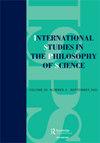Assessing the Overall Validity of Randomised Controlled Trials
IF 0.8
2区 哲学
Q2 HISTORY & PHILOSOPHY OF SCIENCE
International Studies in the Philosophy of Science
Pub Date : 2021-07-03
DOI:10.1080/02698595.2021.2002676
引用次数: 3
Abstract
ABSTRACT In the biomedical, behavioural and social sciences, the leading method used to estimate causal effects is commonly randomised controlled trials (RCTs) that are generally viewed as both the source and justification of the most valid evidence. In studying the foundation and theory behind RCTs, the existing literature analyses important single issues and biases in isolation that influence causal outcomes in trials (such as randomisation, statistical probabilities and placebos). The common account of biased causal inference is described in a general way in terms of probabilistic imbalances between trial groups. This paper expands the common account of causal bias by distinguishing between the range of biases arising between trial groups but also within one of the groups or across the entire sample during trial design, implementation and analysis. This is done by providing concrete examples from highly influential RCT studies. In going beyond the existing RCT literature, the paper provides a broader, practice-based account of causal bias that specifies the between-group, within-group and across-group biases that affect the estimated causal results of trials – impacting both the effect size and statistical significance. Within this expanded framework, we can better identify the range of different types of biases we face in practice and address the central question about the overall validity of the RCT method and its causal claims. A study can face several smaller biases (related simultaneously to a smaller sample, smaller estimated effect, greater unblinding etc.) that generally add up to greater aggregate bias. Though difficult to measure precisely, it is important to assess and provide information in studies on how much different sources of bias, combined, can explain the estimated causal effect. The RCT method is thereby often the best we have to inform our policy decisions – and the evidence is strengthened when combined with multiple studies and other methods. Yet there is room for continually improving trials and identifying ways to reduce biases they face and to increase their overall validity. Implications are discussed.评估随机对照试验的总体有效性
摘要在生物医学、行为科学和社会科学中,用于估计因果影响的主要方法通常是随机对照试验,这些试验通常被视为最有效证据的来源和理由。在研究随机对照试验背后的基础和理论时,现有文献单独分析了影响试验因果结果的重要单一问题和偏差(如随机化、统计概率和安慰剂)。有偏见的因果推断的常见解释是根据试验组之间的概率失衡来描述的。本文通过在试验设计、实施和分析过程中区分试验组之间、其中一组内或整个样本中出现的偏差范围,扩展了因果偏差的常见解释。这是通过提供极具影响力的随机对照试验研究的具体例子来实现的。在超越现有随机对照试验文献的基础上,该论文对因果偏差进行了更广泛的、基于实践的描述,具体说明了影响试验估计因果结果的组间、组内和组间偏差——影响效应大小和统计显著性。在这个扩展的框架内,我们可以更好地识别我们在实践中面临的各种不同类型的偏见,并解决关于随机对照试验方法及其因果声明的总体有效性的核心问题。一项研究可能面临几个较小的偏差(同时与较小的样本、较小的估计效果、较大的揭盲等有关),这些偏差通常加起来会导致更大的总偏差。尽管很难精确测量,但重要的是在研究中评估和提供信息,说明不同的偏见来源加在一起可以解释估计的因果效应。因此,随机对照试验方法通常是我们为政策决策提供信息的最佳方法,当与多项研究和其他方法相结合时,证据会得到加强。然而,仍有不断改进试验的空间,并确定减少他们面临的偏见和提高其总体有效性的方法。讨论了影响。
本文章由计算机程序翻译,如有差异,请以英文原文为准。
求助全文
约1分钟内获得全文
求助全文
来源期刊

International Studies in the Philosophy of Science
HISTORY & PHILOSOPHY OF SCIENCE-
自引率
12.50%
发文量
10
期刊介绍:
International Studies in the Philosophy of Science is a scholarly journal dedicated to publishing original research in philosophy of science and in philosophically informed history and sociology of science. Its scope includes the foundations and methodology of the natural, social, and human sciences, philosophical implications of particular scientific theories, and broader philosophical reflection on science. The editors invite contributions not only from philosophers, historians, and sociologists of science, but also from researchers in the sciences. The journal publishes articles from a wide variety of countries and philosophical traditions.
 求助内容:
求助内容: 应助结果提醒方式:
应助结果提醒方式:


